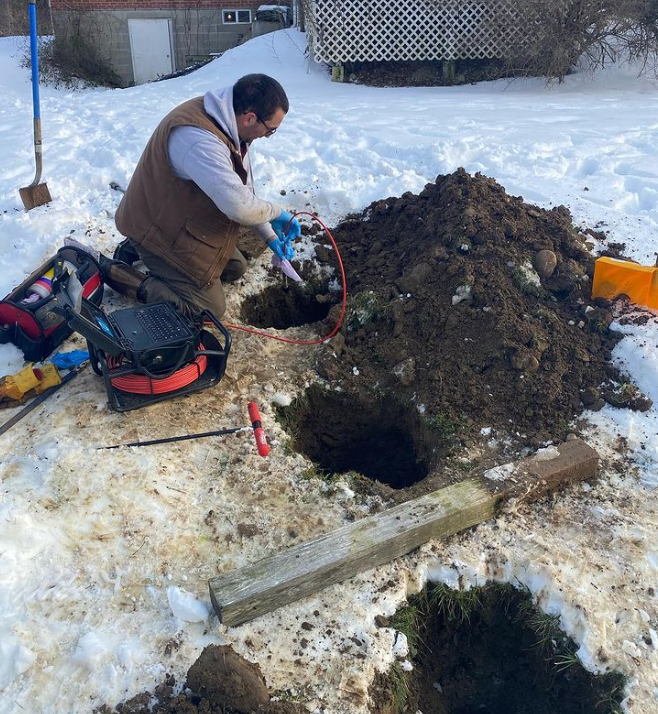
Welcome to our blog, where we debunk some of the most common myths surrounding new home inspections! Whether you are a first-time buyer or a seasoned homeowner, it’s important to understand the truth behind these misconceptions. Many people believe that because a house is brand new, there is no need for an inspection. However, as we will explore in this article, inspecting a new home is just as crucial as inspecting an older one. So let’s dive in and uncover the truth behind these new home inspection myths!
Myth #1: New Homes Don’t Need Home Inspections
When buying a new home, don’t fall for the myth that new constructions don’t need inspections. Many believe that a brand new home, built by professionals, is free of problems. However, this is often not the case.
Even in new homes, builders can make mistakes or miss crucial details. Inspections are essential to uncover hidden issues such as faulty electrical systems, plumbing leaks, insulation flaws, or structural problems.
Skipping an inspection in a new home is a gamble. Without it, you might face expensive repairs later, problems that an early inspection could have identified.
Moreover, an inspection reassures you that a professional has thoroughly checked your investment, offering an unbiased report on the home’s condition.
Always insist on a home inspection, whether the house is newly built or not. It’s a critical step in protecting your investment and ensuring the quality of your new home.
Myth #2: Builder’s Warranty Is Enough
When it comes to buying a new home, many people believe that the builder’s warranty is enough to protect them from any potential issues down the line. However, this is simply not true. The builder’s warranty may cover certain aspects of the home for a limited time, but it does not replace the need for a thorough home inspection.
A builder’s warranty typically covers structural defects or issues with major systems such as plumbing, electrical, and HVAC. While this can provide some peace of mind, it is important to remember that there are many other components of a home that are not covered by this warranty.
For example, cosmetic issues or minor repairs may not be included in the builder’s warranty. Additionally, problems with insulation, roofing materials, or exterior elements like siding or windows may fall outside the scope of coverage.
By relying solely on the builder’s warranty without getting an independent home inspection, you could be putting yourself at risk for future expenses and headaches. A professional inspector will thoroughly assess all areas of your new home and identify any potential problems before they become major issues.
Remember that while a builder’s warranty can offer some protection, it should never be seen as a substitute for a comprehensive home inspection. Investing in an independent inspection will give you peace of mind knowing that your new home is truly safe and sound.
So when purchasing a new construction property – don’t skip out on getting your own trusted third-party inspector.
Myth #3: City or County Inspections Substitute for Home Inspections
City or county inspections are often required for new homes as part of the building permit process. These inspections focus on ensuring that the home meets minimum safety and code requirements set by local authorities. However, it is a common myth that these inspections can substitute for a thorough home inspection conducted by a qualified professional.
While city or county inspections serve an important purpose, they are limited in scope. These inspections primarily focus on structural elements, electrical systems, plumbing, and HVAC systems to ensure compliance with building codes. They do not typically cover cosmetic issues or potential hidden defects within the home.
A comprehensive home inspection goes beyond what is covered in a city or county inspection. A professional inspector will thoroughly examine all visible areas of the property including the roof, foundation, walls, windows and doors, insulation and ventilation systems, appliances, and more.
Additionally, a home inspector has no vested interest in whether you purchase the property or not. Their goal is to provide an unbiased assessment of its condition so that you can make an informed decision about your investment.
Ultimately, while city or county inspections are important for ensuring basic safety standards are met during construction, they shouldn’t be substituted for an independent and detailed home inspection performed by an experienced professional. When you hire your own inspector, you know that you have received a thorough inspection of your new home before making one of your biggest investments.
Myth #4: All Home Inspectors Are the Same
Choosing the right home inspector for your new house is crucial, and it’s a myth that all inspectors are the same. They differ significantly in experience, qualifications, and their ability to notice fine details.
An inspector’s experience is key to a thorough inspection. Experienced inspectors have seen a variety of issues in different homes and know exactly what warning signs to look for. They offer valuable insights and advice based on their vast knowledge.
Qualifications are also essential. Ensure your inspector is certified by a respected organization like the International Association of Certified Home Inspectors (InterNACHI) or the American Society of Home Inspectors (ASHI). These certifications mean the inspector has completed extensive training and follows strict industry standards.
The difference between a good and an average inspector often lies in their attention to detail. A meticulous inspector examines every part of your new home, from the electrical systems and plumbing to the structural integrity and insulation. Their detailed reports provide the assurance that every aspect of the house has been carefully checked.
Remember, choosing the right home inspector can prevent future problems by identifying hidden issues early. Take the time to find a professional who is experienced, well-qualified, and detail-oriented. This step is vital for ensuring your new home is in excellent condition.
Myth #5: New Homes Are Always Up to Code
When it comes to new homes, many people assume that they are automatically up to code. However, this is not always the case. Just because a home is newly built does not guarantee that it meets all of the necessary building codes and regulations.
Building codes can vary from city to city and state to state, so homeowners need to understand that their new home may still have some issues or deficiencies in terms of meeting these requirements.
Furthermore, even if a builder claims that their homes are up to code, mistakes can happen during construction. Oversights or shortcuts taken by contractors could result in non-compliance with building codes.
Homebuyers must hire a professional home inspector who specializes in new construction inspections. These experts will thoroughly examine the property and identify any potential code violations or safety concerns.
Remember, just because a house is brand-new doesn’t mean it’s perfect. Taking the time and effort to have a thorough inspection done on your new home will provide you with peace of mind and ensure that you’re making a wise investment.
Tips for Inspecting a New Home
- Start with a Visual Inspection
Begin by walking around the home’s exterior. Look for damage signs, like foundation cracks or siding gaps. Examine the roof, windows, and doors closely. - Check for Proper Ventilation
Ensure good air quality by verifying all vents are correctly installed and functional. Make sure bathroom and kitchen exhaust fans vent outside, not into the attic. - Test Electrical Systems
Turn on lights to check their functionality. Use an electrical tester on outlets to confirm correct wiring and grounding. - Inspect Plumbing Fixtures
Run water in sinks, showers, and toilets to test drainage and water pressure. Look for leaks or water damage under sinks. - Assess HVAC Systems
Check heating and cooling efficiency. Change filters if needed for better air quality. - Carefully Examine Construction Details
Inspect insulation, window sealants, and door weatherstripping for energy efficiency and comfort.
Remember these tips when inspecting a new home to identify potential issues early, preventing larger problems in the future!
Conclusion
It is important to debunk these myths surrounding new home inspections. While some may believe that new homes don’t need inspections or that the builder’s warranty is enough, this couldn’t be further from the truth. City or county inspections also do not substitute for a thorough home inspection by a qualified professional.
It’s crucial to understand that not all home inspectors are the same. Just like any profession, there can be varying levels of expertise and experience. Therefore, it’s essential to research and find a reputable inspector who specializes in new construction.
Assuming that all newly built homes are always up to code is another misconception. Building codes can vary from one location to another and can change over time. Homeowners need to have an independent inspection done to ensure their new home meets all safety standards.
When inspecting a new home, keep these tips in mind:
- Hire a qualified and experienced home inspector.
- Attend the inspection if possible.
- Take note of any issues or concerns raised during the inspection.
- Request necessary repairs before closing on the house.
- Obtain documentation of completed repairs.
By being proactive and getting an independent inspection done on your new home, you’ll gain peace of mind knowing its true condition and identifying any potential problems early on.
Remember, knowledge is power when it comes to making informed decisions about your investment in a new property!
So don’t let these common myths deter you from scheduling a professional home inspection for your newly constructed dream home! Protect yourself and your investment by ensuring everything is up to par with expert eyes examining every detail.
Happy house hunting!

